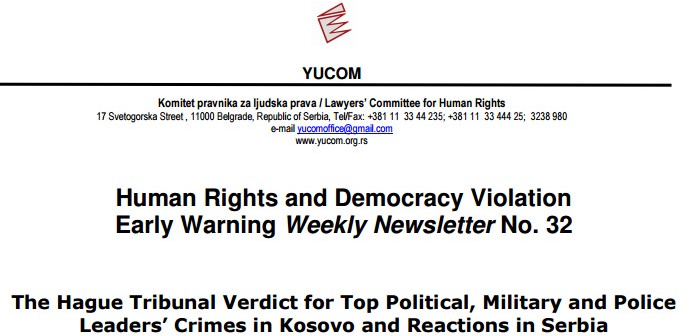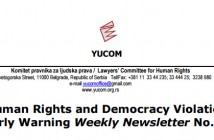The Hague Tribunal Verdict for Top Political, Military and Police Leaders’ Crimes in Kosovo and Reactions in Serbia
The International Criminal Tribunal for the former Yugoslavia’s first verdict ever to deal with crimes committed in Kosovo, which acquitted former President of Serbia Milan Milutinović of all charges, sentenced former FRY Deputy Prime Minister Nikola Šainović, Commander of Army of Yugoslavia’s (VJ) 3rd Corps Nebojša Pavković and Police General Sreten Lukić to 22, whereas former General Staff Chief Dragoljub Ojdanić and VJ General Vladimir Lazarević received 15 years’ imprisonment each, caused much turmoil in political circles and the media and general public alike.
As a reminder: the ICTY Prosecutor indicted the defendants as key participants in a “joint criminal enterprise” to expel hundreds of thousands of ethnic Albanian civilians from March till June 1999, with the aim to “to modify the ethnic balance in Kosovo to ensure continued control by the Serbian authorities”. Key points of the indictment include “deportations, murders, forcible transfers and persecutions of Kosovo Albanians”.
This was the first time that top representatives of Serbia’s military and political leaderships have been charged with persecution of Kosovo Albanian population (i.e. ethnic cleansing in Kosovo), and indicted for a “joint criminal enterprise”. The fact that Milan Milutinović — President of Serbia at that time — was acquitted of all charges, suggests to the expert public and laity alike that what was on trial in The Hague were the crimes committed in the name of that regime’s policy rather than the policy itself. It is thus underlined that command responsibility does not represent objective accountability per se – as frequently argued by experts. As a substitute to an unbiased analysis, “patriotic circles” consider the former President’s acquittal as an act of his betrayal rather than expression of the Tribunal’s objectivity when assessing evidence and individual defendants’ personal involvement in the execution of concrete felonies.
The ICTY’s verdict undoubtedly represents a decision of historic significance, because it finally demystifies the artificially imposed legend that only Serbia and the Serbs have been victims of Kosovo Albanians and their patrons in the international community, as well as that there has been no persecution of ethnic Albanians during the Serbian rule; allegedly, Albanians fled from Kosovo because of NATO air raids in the spring of 1999.
Most politicians from the ruling coalition and most of the opposition alike reacted to the ICTY verdict stopping short of mentioning that top political and military leaders were declared guilty of very grave war crimes. Their reactions cover a span between terming the sentences “draconic” or “disproportionate” (Prime Minister Mirko Cvetković) and angry condemning the ICTY as “anti-Serb” and “political”, as well as accusing it of “double standards” in relation to the indicted Serbs and their Albanian or Bosniak (B&H) pendants. While Chairman of the National Committee for Cooperation with the ICTY, Minister Rasim Ljajić, warns that such sentences will “increase Serbia population’s animosity towards ICTY”, a spokesman of the (former Prime Minister Koštunica’s) Democratic Party of Serbia (DSS) argued that they represent a “justification of the 1999 NATO air raids” against FRY. Only some representatives of the opposition political groups, NGOs and media (Liberal Democratic Party, Helsinki Committee for Human Rights in Serbia, Humanitarian Law Center and YUCOM, as well as e-novine) look upon the verdict as an opportunity to finally open a process of confrontation with the recent past and condemn the crimes committed during the 1990s wars.
President of the Republic of Serbia Boris Tadić has not expressed his view on the Tribunal’s decision.
Sensationalistic approach and appeals on an emotional attitude toward the defendants as victims of injustice dominate the media coverage, while there is almost no mention of the features and essence of the crimes they are charged with. The pro-Government daily Politika is an exception: its front page carries a headline: “The Hague: There was a plan to forcibly evict Albanians”. The so-called “tabloids” — which in fact represent mouthpieces of hard line advocates of the 1990s policies ant their patrons in present-day Serbia’s politics, business and estranged centers of power — are dominated by calls for alert in the face of “96 years for the Serbs” (Pravda) or laments over Serbia’s ill fate: “Serbia will cry” (Alo!).
Defense lawyers who represented the accused expressed views that denounce the sentences as unjust and political, whereas the defendants are depicted as victims of an anti-Serbian conspiracy.
General public’s views, expressed in on-the-spot surveys, comments on internet pages or blogs, are mixed; however, what most of them have in common is that they ignore the ICTY’s view that what we are dealing with is a joint criminal enterprise backed by the state.
While a level of empathy is to be detected in print, electronic and internet media whose critical attitude towards the recent past is well known, it can be assessed that another opportunity was missed to move towards facing the crimes committed in the name of Serbia’s citizens and, especially, an opportunity to pay respect to the victims of that policy.
Outlook:
The Hague Tribunal’s verdict has shown that — contary to Serbian authorities’ proclaimed willingness to cooperate — there is permanent political mistrust towards the ICTY, as well as manipulation with verdicts that are interpreted according to the pragmatism of daily politics rather than an expression of genuine distancing from the crimes committed by the then leadership of Serbia. „Defending“ Serbian interests by means of a more or less direct negation of crimes committed, leads towards Serbia’s even deeper entrenchment into the cul-de-sac of endless repetition of the senseless statement that Serbia is allegedly willing to transfer Gen. Mladić to the ICTY “as soon as he is located”. Associating this verdict for crimes committed in Kosovo with the International Court of Justice’s procedure to issue an advisory opinion on the legality of Kosovo’s declaration of independence will most probably represent the most topical issue of upcoming debates that will lead Serbia closer to the abyss of defense of crimes and their perpetrators. Serbia will thus decrease the chances to join contemporary European and world integration processes any time soon.
Addendum: Characteristic headlines on the front pages of Feb. 27, 2009 newspapers:
Gradjanski list:
Milutinović freed, others to serve long, hard time
Blic:
Generals drastically punished, Milutinović freed
Borba:
Milutinović free,
others to do 96 years
Kurir:
Fucked!
Politika:
The Hague: Plan to expel Albanians existed
Alo!:
Milutinović [family]happy, Serbia will cry
Pravda:
Hague Shame
96 years for Serbs





